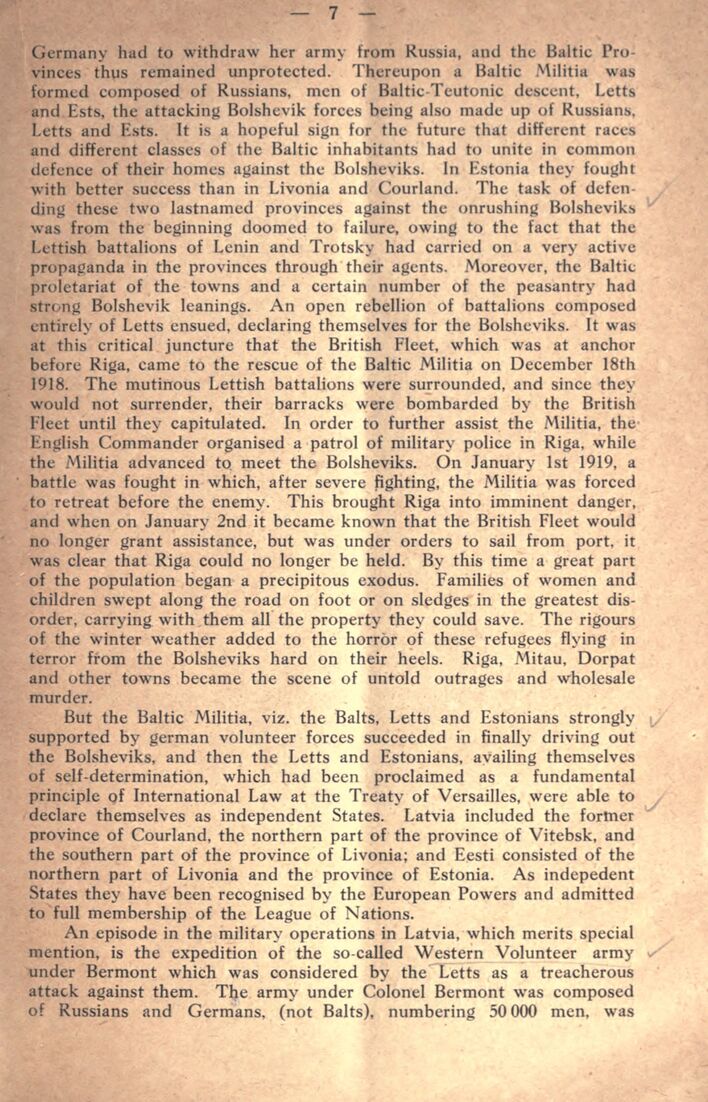
Full resolution (JPEG) - On this page / på denna sida - Chapter I. An Historic Survey of the Cultural Conditions of the Baltic Lands

<< prev. page << föreg. sida << >> nästa sida >> next page >>
Below is the raw OCR text
from the above scanned image.
Do you see an error? Proofread the page now!
Här nedan syns maskintolkade texten från faksimilbilden ovan.
Ser du något fel? Korrekturläs sidan nu!
This page has been proofread at least once.
(diff)
(history)
Denna sida har korrekturlästs minst en gång.
(skillnad)
(historik)
Germany had to withdraw her army from Russia, and the Baltic
Provinces thus remained unprotected. Thereupon a Baltic Militia was
formed composed of Russians, men of Baltic-Teutonic descent, Letts
and Ests, the attacking Bolshevik forces being also made up of Russians,
Letts and Ests. It is a hopeful sign for the future that different races
and different classes of the Baltic inhabitants had to unite in common
defence of their homes against the Bolsheviks. In Estonia they fought
with better success than in Livonia and Courland. The task of
defending these two lastnamed provinces against the onrushing Bolsheviks
was from the beginning doomed to failure, owing to the fact that the
Lettish battalions of Lenin and Trotsky had carried on a very active
propaganda in the provinces through their agents. Moreover, the Baltic
proletariat of the towns and a certain number of the peasantry had
strong Bolshevik leanings. An open rebellion of battalions composed
entirely of Letts ensued, declaring themselves for the Bolsheviks. It was
at this critical juncture that the British Fleet, which was at anchor
before Riga, came to the rescue of the Baltic Militia on December 18th
1918. The mutinous Lettish battalions were surrounded, and since they
would not surrender, their barracks were bombarded by the British
Fleet until they capitulated. In order to further assist the Militia, the
English Commander organised a patrol of military police in Riga, while
the Militia advanced to meet the Bolsheviks. On January 1st 1919, a
battle was fought in which, after severe fighting, the Militia was forced
to retreat before the enemy. This brought Riga into imminent danger,
and when on January 2nd it became known that the British Fleet would
no longer grant assistance, but was under orders to sail from port, it
was clear that Riga could no longer be held. By this time a great part
of the population began a precipitous exodus. Families of women and
children swept along the road on foot or on sledges in the greatest
disorder, carrying with them all the property they could save. The rigours
of the winter weather added to the horror of these refugees flying in
terror from the Bolsheviks hard on their heels. Riga, Mitau, Dorpat
and other towns became the scene of untold outrages and wholesale
murder.
But the Baltic Militia, viz. the Balts, Letts and Estonians strongly
supported by german volunteer forces succeeded in finally driving out
the Bolsheviks, and then the Letts and Estonians, availing themselves
of self-determination, which had been proclaimed as a fundamental
principle of International Law at the Treaty of Versailles, were able to
declare themselves as independent States. Latvia included the former
province of Courland, the northern part of the province of Vitebsk, and
the southern part of the province of Livonia; and Eesti consisted of the
northern part of Livonia and the province of Estonia. As indepedent
States they have been recognised by the European Powers and admitted
to full membership of the League of Nations.
An episode in the military operations in Latvia, which merits special
mention, is the expedition of the so-called Western Volunteer army
under Bermont which was considered by the Letts as a treacherous
attack against them. The army under Colonel Bermont was composed
of Russians and Germans, (not Balts), numbering 50 000 men, was
<< prev. page << föreg. sida << >> nästa sida >> next page >>